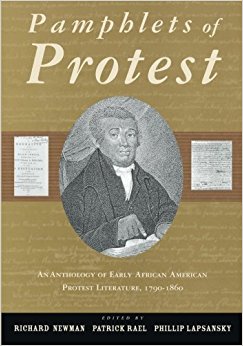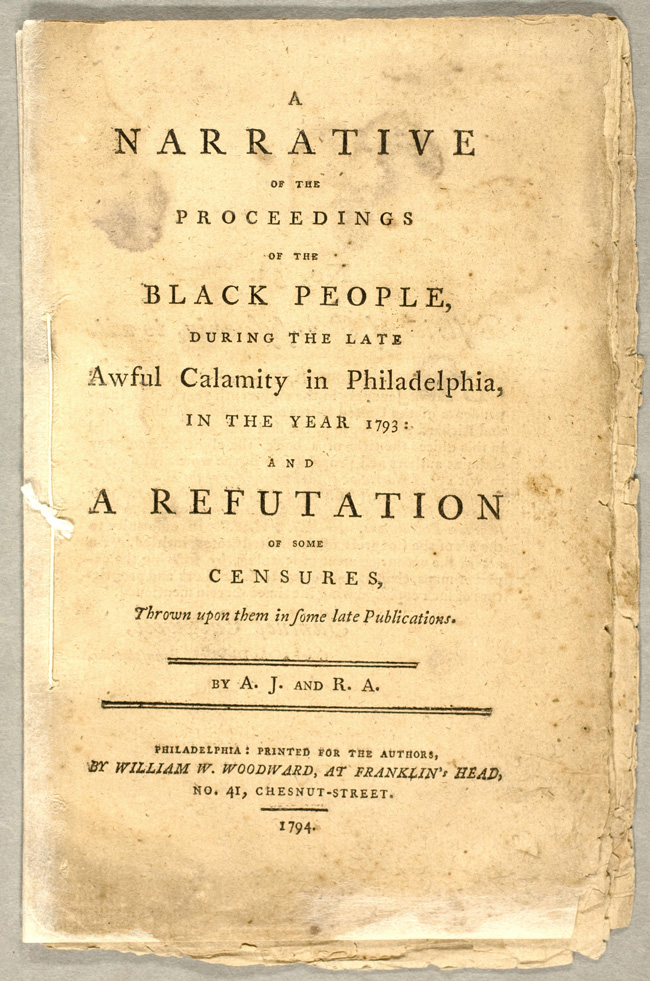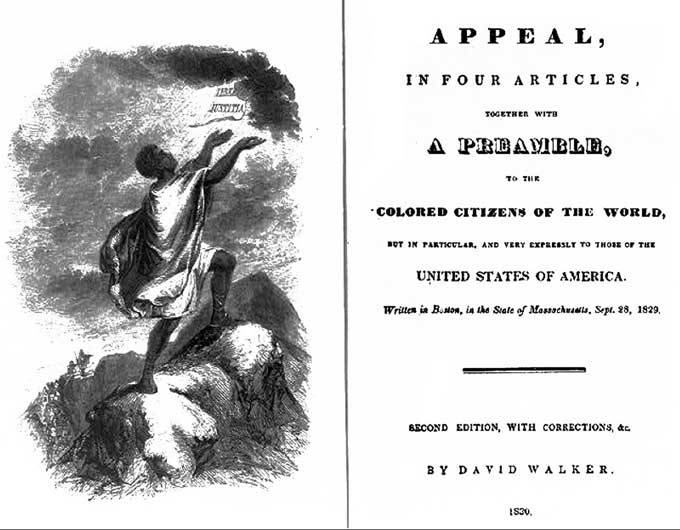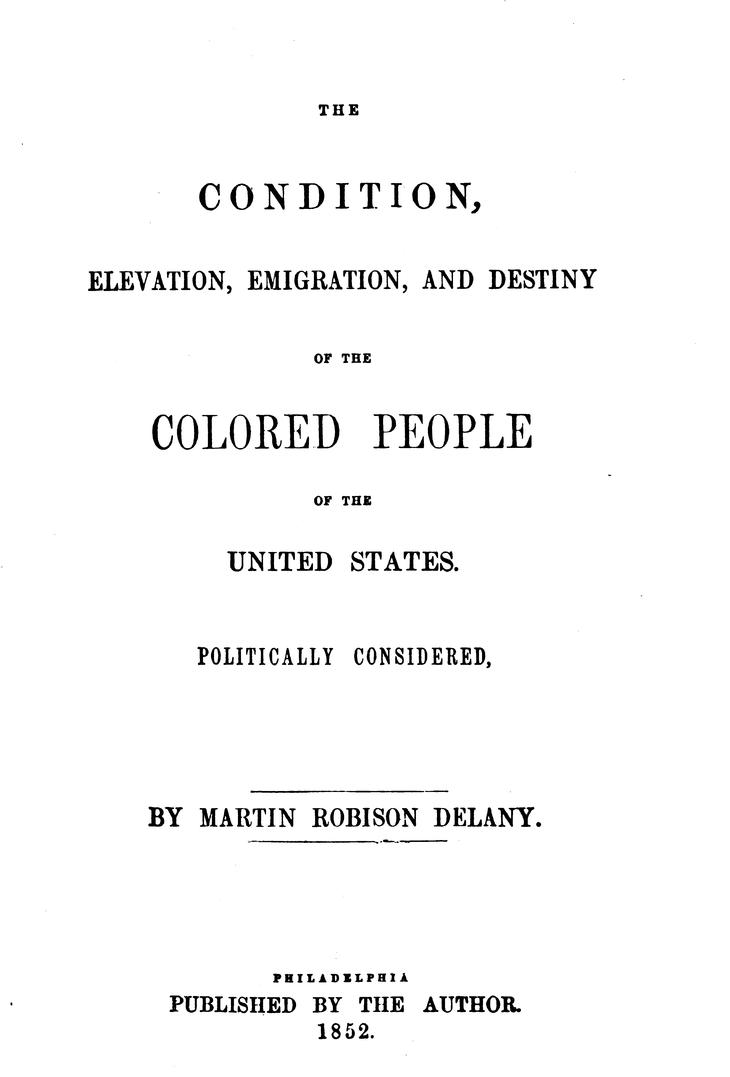

Welcome to the weekend POU!
Today we take a look at Protest Pamphlets authored by African Americans and distributed during the 1800s in protest of slavery.

Black protest influenced the rise of a more radical abolitionist movement after 1830, one which rejected gradualist tactics and strategies. Pamphleteering provided a key vehicle for northern black protest. While scholars have long known about the significance of slave narratives, they have traditionally placed less emphasis on pamphlets of protest. Yet because black pamphleteers remained more independent of white editors than many slave narrators, their documents illuminate a much wider range of issues, from justifications of physically defending fugitive slaves to anti-discrimination efforts in northern communities.
The recent discovery of many of these pamphlets makes them wonderful tools for discussions about the hopes and tactics of black abolitionists. Richard Allen and Absalom Jones’ Narrative of the Proceedings of the Black People, the first African-American publication to receive copyright protection from the federal government (in 1794), offered an important early protest. David Walker’s 1829 Appeal to the Colored Citizens of the World, unflinchingly attacked efforts to deport free people of color and provided a rationale for violent slave resistance . Martin Delany’s 1852 essay, “The Condition, Elevation, Emigration, and Destiny of the Colored People of the United States, Politically Considered,” presaged later black nationalist sentiment. Despite the important distinctions between all of these abolitionist appeals, we find several similarities. African Americans remained committed to the freedom struggle, and though tactics may have changed, this commitment never wavered.
Richard Allen and Absalom Jones’ Narrative of the Proceedings of the Black People

In a widely-read pamphlet distributed on the heels of the 1793 yellow fever epidemic, Philadelphia publisher Mathew Carey accused the black community of profiteering from the disease and of plundering the houses of the sick.
In response to Carey’s libel against their community, which by then was already in a fourth edition, Richard Allen and Absalom Jones published A Narrative of the Proceedings of the Black People, During the Late Awful Calamity in Philadelphia in the Year 1793 and a Refutation of Some Censures, Thrown upon them in some late Publications.
They noted that “Mr. Carey’s first, second and third editions… in all probability, have been read by thousands that will never read his fourth — consequently, any alteration he may hereafter make… cannot have the desired effect, or atone for the past; therefore we apprehend it necessary to publish our thoughts on the occasion.
The Narrative documented the courageous actions of the blacks who dedicated themselves to fighting the disease and included a meticulous accounting of payments and expenses.
It was also an indictment of both whites who fled the city — including Carey himself — and those who remained but turned their backs on the sick. Jones and Allen speculated that Carey had “made more money by the sale of his “scraps” than a dozen of the greatest extortioners among the black nurses.”
David Walker’s 1829 Appeal to the Colored Citizens of the World

In September 1829, Walker published his appeal to Black people entitled Walker’s Appeal, in Four Articles; Together with a Preamble, to the Coloured Citizens of the World, but in Particular, and Very Expressly, to Those of the United States of America, Written in Boston, State of Massachusetts, September 28, 1829. The purpose of the document was to encourage readers to take an active role in fighting their oppression, regardless of the risk, and to press white Americans to realize the moral and religious failure of slavery.
The appeal brought attention to the abuses and inequities of slavery and the role of individuals to act responsibly for racial equality, according to religious and political tenets. At the time, some people were outraged and fearful of the reaction that the pamphlet would have. Many abolitionists thought the views were extreme.
Historians and liberation theologians cite the Appeal as an influential political and social document of the 19th century. Walker exerted a radicalizing influence on the abolitionist movements of his day and inspired future black leaders and activists.

In 1852, Martin Delany published the first book-length defense of African American emigration away from the United States, urging blacks to act collectively to form an independent republic. This influential work, The Condition,
Elevation, Emigration, and Destiny of the Colored People of the United States, strongly encouraged free and fugitive blacks to leave the United States in order to avoid oppression and to build a sovereign nation-state that would enable blacks to live under conditions of equality and liberty.
The book was written in the wake of the Fugitive Slave Law (a component of the notorious 1850 Compromise), which enabled slaveholders to pursue runaway slaves even in nonslaveholding territories and which, in effect, made free blacks (even more) vulnerable to being enslaved, as they would have no reliable legal recourse should some slaveholder falsely claim them as fugitive property. This white supremacist tactic caused a budding mass movement for black emigration to grow and be energized.
In The Condition, Delany famously describes blacks in the United States as an oppressed “nation within a nation.” These subjugated internal nations are, he claims, unjustly deprived of social and political equality by the ruling
classes; they are subject to the most naked and brutal exploitation; and they are often restricted to the most devalued positions within the society in which they live and work. Moreover, in order to legitimize its dominant status, the
ruling elite regards these subordinate nations as inherently inferior and thereby incapable of self-government.
More moderate abolitionists were alienated by his position, and they resented his criticism of those who failed to hire colored men in their own businesses.
